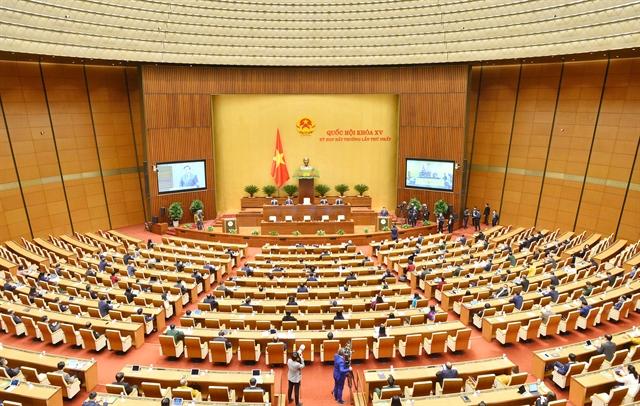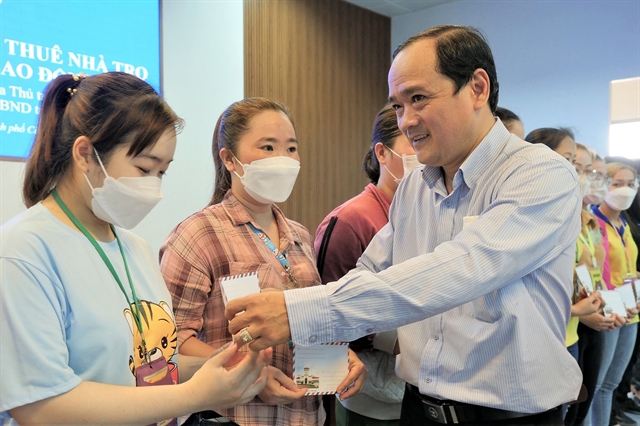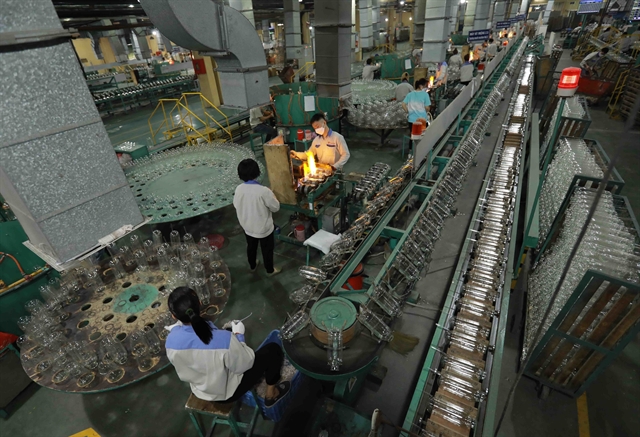 Society
Society

 |
| NEW STAFF COMING: A worker operates machines at An Phát Garment Company in Bình ĐỊnh Province. The company was granted a loan of VND13 billion with an interest rate of zero per cent according to a policy of the Government on supporting employers affected by the COVID-19 pandemic and is now operating well and hiring 1,600 labourers. |
Việt Nam outperformed other countries in the region, with gross domestic product growing 8.02 per cent in 2022, the fastest pace annually since 1997.
According to UNDP Resident Representative Ramla Khalidi, Việt Nam has bright economic prospects.
“Evidence of a strong recovery is welcome news after two years of economic disruption caused by the pandemic. Vietnamese households will enter the Year of the Cat in 2023 in better financial shape than a year ago,” she said.
After two years of struggling with COVID-19, seemingly the biggest game changer of the global economy in the century, Việt Nam has found its way to respond appropriately to the pandemic and even thrive.
In January 2022, the Government issued Resolution 11/NQ-CP (or Resolution 11). This resolution is on the socio-economic recovery and development programme, and implementation of Resolution 43/2022/QH15 (or Resolution 43) of the National Assembly (NA) on fiscal and monetary policies to support the programme worth US$15 billion, about 4.5 per cent of GDP.
It aims to recover production and business activities of companies and promote optimised economic growth by stabilising the economy and ensuring social security for the people of Việt Nam. Resolution 11 includes various policies such as tax reduction and investment plans.
Accordingly, the resolution aims to revitalise and develop production and business activities, promote growth momentum, and strive for a 6.5-7 per cent annual GDP growth rate in 2021-2025.
The NA permitted overspending of the state budget in 2022 and 2023 with an average of 1-1.2 per cent of GDP. Regarding tax, the resolution slashes value-added tax by 2 per cent to 8 per cent for groups of goods and services currently being applied the 10 per cent VAT rate, with the exceptions of telecommunication services, information technology, financial activities, banking, securities, insurance, and real estate business.
The lawmakers agreed to put aside VNĐ176 trillion from the central budget for development investment in modernising grassroots healthcare systems, regional disease control centres, central-level hospitals, and other public investment projects in 2022 and 2023.
 |
| MAJOR MEETING: The first extraordinary meeting of the Standing Committee of the NA was organised in January 2022 to discuss the resolution on the socio-economic recovery and development programme. |
The NA gave a nod to provide the Việt Nam Bank for Social Policies a maximum of VNĐ5 trillion on preferential loans. Another VNĐ3.1 trillion will be spent on building, renovating, upgrading and modernising vocational training facilities and social support establishments.
Enterprises, collectives, and household businesses will benefit from a 2 per cent support in paying loan interest rate with a maximum of VNĐ40 trillion.
Another VNĐ113.5 trillion was given to develop transport infrastructure, IT, digital conversion, landslide prevention and climate change response.
In addition, the NA also approved VNĐ46 trillion of other financial sources for importing vaccines, drugs, and medical supplies for COVID prevention.
Achievements
A permanent member of the Finance and Budget Committee of the NA, Trần Văn Lâm, said all mechanisms and policies in Resolution 43 had come into life and proved effective, promptly supporting those who have difficulties in life, production and business.
“Those are mechanisms to support the recovery of production and business, timely policies to stabilise the macroeconomy, and control inflation, and serves as appropriate stimulus and promotion policies for recovery and growth,” Lâm said.
 |
| CASH IN HAND: An official of Cà Mau Province grants money to labourers in Cà Mau City as part of the Government's programme on supporting rents for workers. |
The Ministry of Planning and Investment report shows that the domestic macro-economy of 2022 continued to remain stable, inflation was under control, major balances were ensured, and monetary and fiscal policies were properly managed.
The business investment environment has been improved, contributing to socio-economic recovery and development, and creating the trust and support of the people and the business community.
“Many solutions have been implemented, especially those related to the banking system, corporate bond markets, securities and real estate. The Government and the Prime Minister have issued resolutions with a focus on properly assessing the situation and cause, developing and implementing solutions to manage macroeconomic policies promptly and effectively,” said Deputy Minister of Planning and Investment Trần Quốc Phương.
Apart from a high GPD growth, many industries have recovered strongly in both production and business activities, such as agriculture, forestry and fisheries.
The business environment prospered, with the number of enterprises entering the market increasing to 208,000, up 30 per cent. Realised foreign direct investment capital in Việt Nam in 2022 was estimated at nearly $22.4 billion, up 13.5 per cent, the highest in the past five years.
Notably, import-export turnover saw record growth, reaching $732.5 billion, an increase of 9.5 per cent.
The International Monetary Fund considers Việt Nam as at the top of ASEAN-5 with a high growth rate in 2022, while the Asian Development Bank thinks Việt Nam is growing rapidly in an uncertain global economy.
 |
| PROBLEM SOLVING: Workers at the Rạng Đông Company in Bắc Ninh Province. The company has implemented many solutions to adapt to the new normal and quickly resume production. VNA/VNS Photos |
Currently, Việt Nam is the only country in the Asia-Pacific region and one of four countries in the world to be upgraded by Moody's in 2022.
“The results of socio-economic growth and development in 2022 had exceeded expectations when we issued Resolution 43,” said Lâm from the Finance and Budget Committee of the NA.
According to General Secretary of the NA Bùi Văn Cường, convening the first extraordinary meeting of the Standing Committee of the NA was a historic decision of the Vietnamese legislature in the past 76 years. It affirmed the political determination of the NA and its deputies, who always strive to innovate and act decisively in people's interests.
The resolution allows the application of a specific mechanism whereby the Prime Minister considers and decides on the appointment of contractors 2022-2023, including consulting bidding packages, bidding packages of important national projects, and important infrastructure projects of large scale and urgency in terms of transport and healthcare infrastructure.
As a result, in the past year, Resolution 43 has come to life through the Government's action plan and measures and solutions that are unprecedented, such as the procurement of medical equipment, the purchase of vaccines, the implementation of universal vaccination, and supporting businesses.
For 2023, the Ministry of Finance said that it had suggested the Government submit to the NA Standing Committee an additional VNĐ6.6 trillion in financial support in terms of housing for employees according to Resolution 43. So far, the ministry has granted more than VNĐ4.3 trillion to 31 localities.
In addition, the policy to support the recovery of enterprises, cooperatives and business households has been implemented with a total tax extension of about VNĐ106 billion, equal to about 78.5 per cent of the expected amount when developing the programme (VNĐ135 trillion).
The total tax exemption and reduction is over VNĐ50 trillion, accounting for 78.4 per cent of the expected amount.
More tasks to accomplish
NA deputy Vũ Tiến Lộc, a member of the NA's Economic Committee (NAEC), however, said that it was necessary to speed up the progress of disbursement under the programme.
According to the NAEC, the rate of disbursement of the policies under the programme was relatively low at 20 per cent or $2.65 billion of the programme’s total capital, as of October.
Moreover, disbursement of the infrastructure development package was also slow – specifically, and it was not until late August that the government submitted to the NA Standing Committee a report on the investment portfolio and capital quotas for projects and tasks within the programme.
In another case, the programme's 2 per cent lending rate support package has seen a meagre disbursement rate via the commercial bank system. The total value of this package is VNĐ40 trillion for 2022-2023.
Vũ Hồng Thanh, NAEC chairman, said the implementation of assistance policies under the programme was facing some tough conditions, making it difficult for enterprises to access and benefit from the policies. Meanwhile, administrative procedures remain complicated, with unclear conditions for benefiting from policies, reducing effectiveness.
It is recommended that there must be more specific assessments on the results and implementation of Resolution 43 under each concrete policy.
“This includes the usage of the fund for scientific and technological development for enterprises and the increase in the charter capital of state-owned commercial banks and commercial banks whose 50 per cent stake is owned by the state. It is also necessary to clarify limitations, with solutions proposed,” he said.
“There are opinions that things have changed since Resolution 43 was formulated and enacted, so it is necessary to revise some policies during implementation.”
Vũ Quốc Huy from the Việt Nam Economic Institute, who works in a study group on the programme for economic-socio recovery, said his group had offered some adjustments to the programme.
Regarding the support package for the health sector, the group suggested building a separate recovery and development programme for the health sector.
Regarding the package for social welfare and employment, the group said while housing support for workers and employees should be maintained, support in terms of employment overlaps with other existing programmes and thus should be moved to those programmes. Further funding for these programmes can be considered.
The package to provide computers for schools and support for kindergartens is no longer suitable, so it should be stopped or moved to existing funds/programmes.
In terms of decreasing taxes for businesses, the group said this should be expanded, while the support interest rate (2 per cent per year) should be slashed since there were conflicts with current policies and unwanted long-term consequences.
Minister of Planning and Investment Nguyễn Chí Dũng said that when designing and proposing policy packages, it was expected that after two years of implementation, it would help the economy recover and grow and prepare conditions for rapid and strong growth in the following years.
However, adverse global fluctuations had been causing great challenges. With a large openness, many growth drivers of the Vietnamese economy had been affected, and many things could be done better. Due to external circumstances, the desired results had not been achieved.
“However, the Ministry of Planning and Investment continues to recommend measures and solutions to effectively and substantively carry out the socio-economic development and recovery programme," Dũng said. VNS